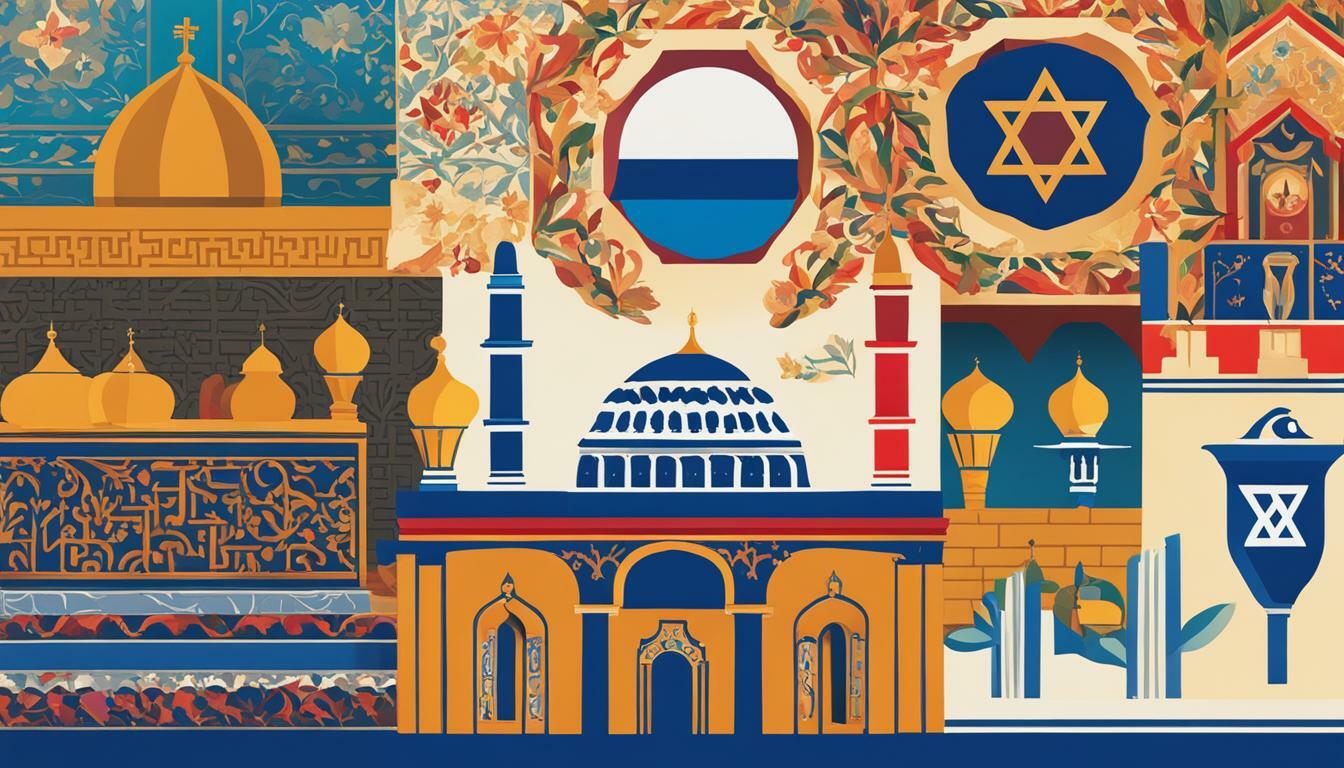Israel is a country with a rich linguistic landscape, where the official languages are Hebrew and Arabic. Hebrew, spoken by almost the entire population, serves as the primary language in Israel, either as a native language or a second language. Arabic, on the other hand, is predominantly spoken by the Arab minority, which comprises about one-fifth of the population. In addition to Hebrew and Arabic, there are other languages spoken in Israel, including Russian, English, and various minority languages.
Key Takeaways:
- Hebrew and Arabic are the official languages of Israel.
- Hebrew is the primary language spoken by the majority of the population.
- Arabic is mainly spoken by the Arab minority.
- Russian and English are also widely spoken in Israel.
- There are several minority languages spoken in Israel, such as Domari, Romanian, German, Polish, Ladino, Yiddish, Hungarian, French, and Persian.
Hebrew: The Primary Language of Israel
Hebrew is the dominant language in Israel, spoken by the majority of the population as either their native language or as a second language. It holds immense cultural and historical significance in Israeli society, dating back to ancient times.
According to recent statistics, more than 90% of Israelis are fluent in Hebrew, making it the primary mode of communication in everyday life, business, and education. The language’s widespread usage can be attributed to its adoption as the official language of Israel upon the country’s establishment in 1948.
Hebrew is not only a language but a symbol of national identity for Israelis. It has evolved over centuries and plays a crucial role in preserving Jewish traditions, connecting people to their heritage, and fostering a sense of unity among diverse communities. The revival and modernization of Hebrew as a spoken language is considered one of the greatest linguistic achievements of the 20th century.
| Key Points about Hebrew |
|---|
| Hebrew is the official language of Israel. |
| It is spoken by the majority of Israelis. |
| Hebrew holds immense cultural and historical significance. |
| It plays a central role in preserving Jewish traditions. |
| Hebrew connects Israelis to their national identity. |
Hebrew’s dominance in Israel is a testament to the country’s commitment to its historical roots and the strength of its linguistic heritage. It is a language that unifies the diverse population and serves as a bridge between past and present.
Arabic: Language of the Arab Minority
Arabic is an important language in Israel, particularly among the Arab minority, comprising about one-fifth of the country’s population. It holds a significant role in Arab communities and daily life, contributing to their cultural and religious identity.
Within these communities, Arabic is not just a means of communication, but also a symbol of heritage and unity. It is the language used in religious ceremonies, poetry, literature, and traditional music. Arabic plays a pivotal role in preserving the Arab cultural traditions and passing them on to future generations.
The Arabic language in Israel is diverse, with different dialects influenced by regional variations. Despite the linguistic diversity, it remains a unifying force among the Arab minority, fostering a strong sense of community and solidarity.
It is worth noting that while Hebrew is the primary language of the majority population, many Israelis, including Jews, also have a proficiency in Arabic. This language proficiency fosters understanding and promotes peaceful coexistence between different communities in Israeli society.
Table: Languages Spoken in Israel
| Language | Percentage of Population |
|---|---|
| Hebrew | Approximately 80% |
| Arabic | Approximately 20% |
| Russian | Approximately 20% |
| English | Widely spoken |
| Various minority languages | N/A |
Overall, the linguistic landscape in Israel is rich and diverse. The coexistence of multiple languages, including Arabic, reflects the multicultural nature of the country. It underscores the importance of language as a tool for cultural preservation, communication, and fostering understanding among different communities.
Russian: A Language with a Significant Presence
Russian enjoys a significant presence in Israel, with around 20% of the population speaking it as their native or second language. The presence of Russian can be attributed to historical and cultural factors, including the immigration of Russian-speaking Jews to Israel during the late 20th century.
Many Russian speakers in Israel maintain strong connections to their Russian heritage and often use Russian as their primary language of communication within their communities. This has led to the development of Russian-language media, businesses, and cultural institutions that cater to the needs and interests of the Russian-speaking population.
In addition to Russian, Israel is home to a diverse range of languages spoken by minority groups. These languages reflect the multicultural nature of Israeli society and include Domari, Romanian, German, Polish, Ladino, Yiddish, Hungarian, French, and Persian. Each of these languages contributes to the linguistic tapestry of Israel, adding to its cultural richness and diversity.
Table: Languages Spoken in Israel
| Language | Percentage of Population |
|---|---|
| Hebrew | 100% |
| Arabic | ~20% |
| Russian | ~20% |
| English | Widely spoken |
| Domari, Romanian, German, Polish, Ladino, Yiddish, Hungarian, French, Persian | Varied percentages |
The linguistic diversity in Israel is not only a reflection of its immigrant past but also a testament to the country’s commitment to inclusivity and respect for cultural heritage. The coexistence of multiple languages fosters cross-cultural understanding and enriches the social fabric of Israeli society.
English: Widely Spoken in Israel
English is widely spoken and understood in Israel, thanks to its usage in official signage and its role as a common language for international interactions. Many Israelis learn English as a second language from a young age, and it has become an integral part of daily life in the country.
With Israel’s strong ties to the global community and its booming tech industry, proficiency in English is highly valued and sought after. English is the language of choice for business negotiations, academic studies, and even social media interactions. It allows Israelis to connect with people from all over the world and opens up opportunities for cultural exchange and collaboration.
Furthermore, the importance of English is reflected in the country’s public infrastructure. Official logos and road signs are often displayed in both Hebrew and English, making it easier for both locals and tourists to navigate their way around. This ensures that English speakers can confidently explore the vibrant streets of cities like Tel Aviv or Jerusalem without any language barriers.
The linguistic diversity in Israel, with Hebrew, Arabic, Russian, and other languages being spoken, is a testament to the country’s inclusiveness and multiculturalism. English serves as a bridge between these different communities, allowing for effective communication and unity.
Language Diversity in Israel
In addition to Hebrew, Arabic, Russian, and English, Israel is home to a vibrant tapestry of languages spoken by various minority communities. This linguistic diversity is a reflection of the country’s multicultural nature and the diverse origins of its population. From Domari to French, each language adds a unique flavor to the cultural landscape of Israel.
One of the notable minority languages spoken in Israel is Domari, a language of the Dom people. The Dom community, also known as the Nawar, have a rich history and their language reflects their distinct culture and heritage. While Domari is not widely spoken, it plays an important role in preserving the cultural identity of the Dom people.
Another language spoken by minority groups in Israel is Ladino, also known as Judeo-Spanish. Ladino is primarily spoken by Sephardic Jews, descendants of Jews expelled from Spain in the 15th century. It is a testament to the enduring legacy of Sephardic culture and is cherished as a link to the past. The Ladino-speaking community in Israel actively works to ensure the language’s survival through education and cultural events.
| Language | Number of Speakers |
|---|---|
| Domari | Unknown |
| Ladino | Unknown |
“Languages are not just tools of communication; they represent the diversity and richness of our society.” – Unknown
The presence of these languages, along with others like Romanian, German, Polish, Yiddish, Hungarian, and Persian, serves as a testament to the cultural mosaic that thrives in Israel. While these languages may not be widely spoken, they hold great value in preserving cultural traditions and connecting communities. They remind us of the importance of embracing and celebrating diversity, even in the realm of language.
In conclusion, language diversity in Israel extends far beyond Hebrew and Arabic. It encompasses a multitude of languages spoken by various communities, each contributing to the rich tapestry of Israeli society. This linguistic variety reflects the multiculturalism and inclusivity of Israel, making it a truly fascinating and vibrant country.
Summary:
- Israel’s diverse linguistic landscape includes languages such as Domari, Ladino, Romanian, German, Polish, Yiddish, Hungarian, French, and Persian, among others.
- These minority languages play a crucial role in preserving cultural identities and connecting communities.
- Israel’s language diversity reflects its multicultural society and serves as a reminder of the importance of embracing and celebrating differences.
The Historical and Cultural Significance of Languages in Israel
The languages spoken in Israel play a crucial role in preserving traditions, strengthening cultural ties, and reflecting the nation’s complex history. Hebrew, as the primary language and an official language of Israel, serves as a symbol of Jewish identity and a testament to the revival of a once-dormant language. The revival of Hebrew in the early 20th century was instrumental in the establishment of the modern State of Israel and continues to serve as a unifying force among its diverse population.
Arabic, as another official language of Israel, holds historical and cultural significance, particularly among the Arab minority. It is a language deeply rooted in the region and encompasses the rich heritage of Arab traditions and customs. The preservation and recognition of Arabic serve to honor and respect the cultural diversity within Israeli society, promoting inclusivity and fostering intercultural understanding.
Furthermore, the presence of languages such as Russian, English, and other minority languages in Israel reflects the country’s multicultural fabric. Russian, spoken by a significant portion of the population, is a reminder of the waves of immigration from the former Soviet Union, shaping cultural aspects and contributing to Israel’s vibrant tapestry of languages.
“Language is the road map of a culture. It tells you where its people come from and where they are going.” – Rita Mae Brown
The multitude of languages spoken in Israel provides a unique opportunity for individuals to connect with their heritage, maintain cultural traditions, and strengthen their sense of belonging. Every language spoken within the country’s borders brings with it a story, reflecting the diverse backgrounds and histories of its speakers. It is this mosaic of languages that contributes to the richness and vitality of Israeli society, reminding us that language transcends borders and builds bridges between different communities.
| Language | Percentage of Population |
|---|---|
| Hebrew | Almost the entire population |
| Arabic | One-fifth of the population |
| Russian | About 20% of the population |
| English | Widely spoken |
| Other Minority Languages | Various minority communities |
In summary, the languages spoken in Israel reflect its diverse cultural heritage and historical roots. Hebrew and Arabic, as official languages, hold immense importance in preserving traditions and fostering cultural connections. Russian and English, along with various minority languages, contribute to the multicultural fabric of Israeli society. The linguistic landscape of Israel is a testament to the country’s inclusive nature and the value placed on embracing and respecting different cultural identities.
Conclusion
In conclusion, Israel boasts a diverse linguistic landscape, with Hebrew and Arabic as the official languages and a multitude of other languages spoken by various communities, illustrating the country’s multiculturalism and inclusivity.
Hebrew, the primary language of Israel, is spoken by almost the entire population, either as a native language or a second language. Arabic holds significant importance among the Arab minority, comprising about one-fifth of the population.
Aside from Hebrew and Arabic, Russian is spoken by approximately 20% of the population, while English has gained widespread usage due to its incorporation in official logos and road signs.
Furthermore, Israel’s linguistic diversity extends to minority communities, who speak languages such as Domari, Romanian, German, Polish, Ladino, Yiddish, Hungarian, French, and Persian, among others. This myriad of languages reflects the vibrant multiculturalism present within Israeli society.
FAQ
What languages are spoken in Israel?
The official languages of Israel are Hebrew and Arabic. Hebrew is the primary language spoken by the majority of the population, while Arabic is mainly spoken by the Arab minority.
How prevalent is the Hebrew language in Israel?
Hebrew is widely spoken in Israel, with almost the entire population using it as either a native language or second language. It holds great significance in Israeli society and is the language of instruction in schools, government, and daily life.
What is the importance of the Arabic language in Israel?
Arabic plays a vital role in Israel, particularly among the Arab minority population. It is used in Arab communities, official documents, and cultural activities, contributing to the rich diversity of languages in the country.
How significant is the Russian language in Israel?
Russian has a significant presence in Israel, with approximately 20% of the population speaking it. This is due to historical and cultural factors, including the immigration of Russian-speaking communities over the years.
Is English widely spoken in Israel?
Yes, English is widely spoken in Israel. It is used in official logos, road signs, and as a means of international communication. Many Israelis are proficient in English, making it easier for visitors and expatriates to communicate.
Are there any other languages spoken in Israel?
Yes, Israel is home to a diverse range of languages spoken by minority groups. Some of these languages include Domari, Romanian, German, Polish, Ladino, Yiddish, Hungarian, French, and Persian. This showcases the multicultural nature of Israeli society.
What is the historical and cultural significance of languages in Israel?
Languages in Israel play a crucial role in shaping national identity and fostering cultural connections. Hebrew, as the revived ancient language, symbolizes the revival of Jewish sovereignty, while Arabic represents the cultural heritage of the Arab minority. Other languages contribute to the rich tapestry of cultural diversity found in Israel.



